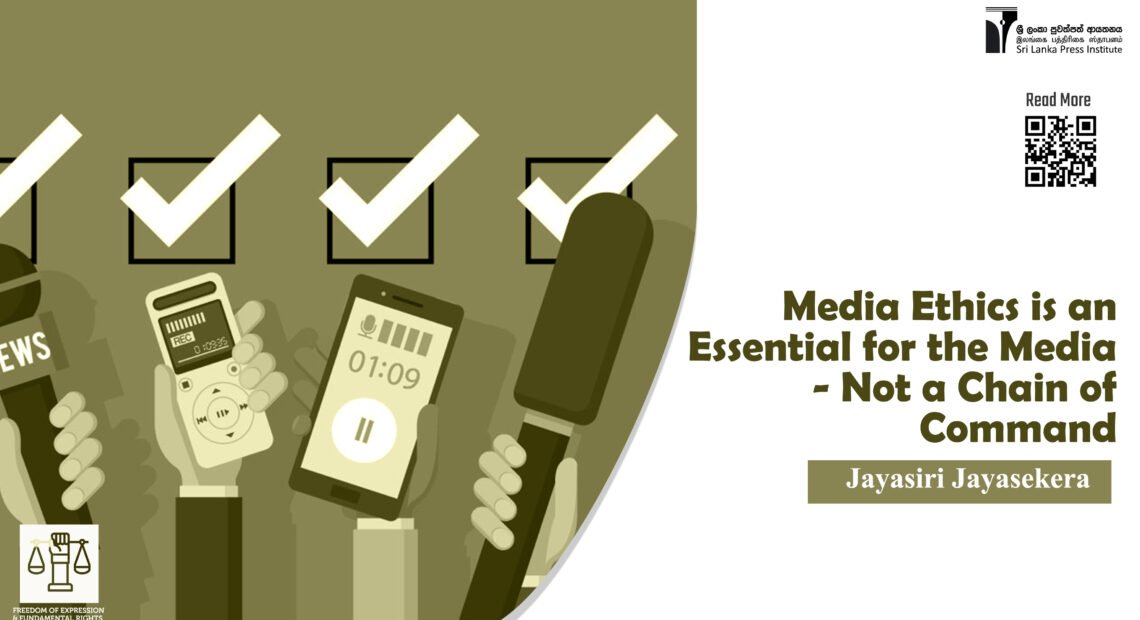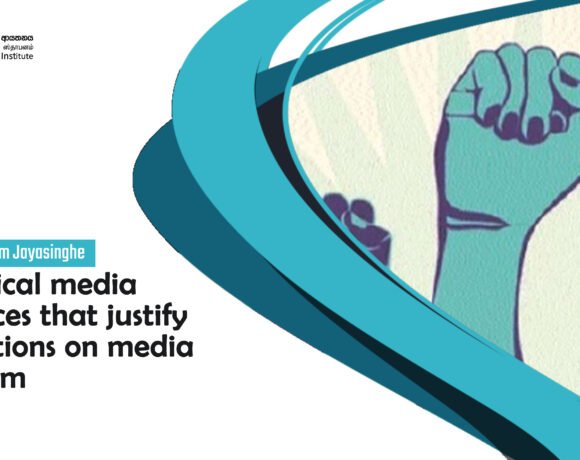
Media Ethics is an Essential for the Media – Not a Chain of Command
Jayasiri Jayasekera
Until recently, ‘Media Ethics’ was a topic confined to a limited number of people in the media field. It was largely seen as the legacy of an elite regime that was interested in the standards and social role of the media. If there was some understanding and attention to media ethics at all, it was confined to the field of print media and was considered by many in the electronic media to be an irrelevant, never-to-be-worn chain of command.
Recently this situation changed drastically. The discourse on media ethics shifted from the media’s elite to the village’s elite. No matter how enthusiastic and heated that conversation has become, ordinary people are sometimes in a position to teach the media salty and sour ethics. There has been strong opposition to the erroneous and insensitive practices of reporting on Covid in particular, and talks have gone so far as to urge journalists to respond with violence.
Unfortunately, the media community doesn’t seem to take this situation seriously. The inevitable result will be that the government’s demands to restrict media freedom will come to the fore, using public opposition as an opportunity. It is already too late but the only way to manage impending danger to some extent is to create a strong dialogue and activism within the media community about the use of ethical media. This post is a prelude to that.
So, where are we on the world map?
It is acknowledged that the debate over world media ethics began in the 1920s. More than 300 years after the beginning of journalism. It is noteworthy that the conversation arose from media professionals, and that a proposal on ethics was first put forward at the 1950 American Press Conference in New York. Ethics is an essential condition for recognizing a field as a profession. The International Court of Honor, established in 1961, laid the groundwork for this, and in 1969 the Code of Conduct for Journalists was published for the first time. The International Union of Press Associations also contributed to this.
The discourse on media ethics in Sri Lanka is at least 40 years old. Under Section 30 of the Sri Lanka Press Council Act No. 5 of 1973, the Extraordinary Gazette Notification entitled ‘Rules of the Press Council of Sri Lanka (Code of Ethics for Journalists)’ was issued on 14th October 1981. Despite the serious criticism of the Press Council Act, the introduction of a code of ethics for the media profession and the provision of a legal basis for it, are important steps forward. Two decades later, the Sri Lanka Editors’ Forum, a group of Sri Lankan newspaper editors, was able to introduce a more formal and ethical code of conduct, and in 2003 an independent self-regulatory mechanism was established to investigate and resolve complaints of such violations. It is a significant achievement of the Media Club (newspaper editors, media owners and media organizations) based on the Colombo Declaration on Media Freedom and Social Responsibility released in April 1998.
It is important to note that by the time a formal code of ethics was developed for the print media, it had been a century and a half (150 years) since inception in Sri Lanka. Radio, the first electronic medium started in 1924. Although there was no formal code of ethics here, some policy framework for the operation of radio was formed 42 years later by way of the Sri Lanka Broadcasting Corporation Act No. 25 of 1966. Television services in Sri Lanka were established with the launch of the Independent Television Network (ITN) in 1979 and the Rupavahini Corporation Act No. 6 of 1982 which also introduced criteria for the objectives and functionality of the television service. It has been nearly 40 years since, but so far there is no formal code of ethics for electronic media. With the establishment of private radio and television channels in 1991, the government’s monopoly on the electronic media was abolished and a massive electronic media network was set up for the sole purpose of achieving profit and political agendas. Although this media network has been able to turn Sri Lankan society upside down for the past two decades, no one has been able to bring the activities of those media into a certain ethical framework throughout the past twenty years. That problem has now become a challenge to the entire media industry.
The Challenge of Independent Regulation
The Press Complaints Commission of Sri Lanka was established in 2003 as an alternative to the Press Council of Sri Lanka. The Ranil Wickremesinghe government of that time supported the attempt of the media community by disabling the Press Council (established under the Press Council Act), which contained elements detrimental to the freedom of the media. But that process did not move forward due to the short-lived tenure of that government. The next government that came to power, re-enacted the Press Council after a brief hiatus.
On the other hand, independent regulation was limited from the beginning. The main challenge is not being able to control all the print media. It could only affect newspapers that are obliged to uphold those ethics through membership of the Sri Lanka Editors’ Forum. The Sunday Leader, edited by Lasantha Wickrematunge in its infancy, did not accept its regulation. There were also other publications that were not members of the editorial board. Attempts to bring the rapidly growing web media into its scope were also unsuccessful. Another problem is that the code of ethics of the editorial board is a purely nominal and moral, not a legal or professional one.
Ethics is not a condition of a professional appointment and violating it will not endanger one’s job. It is common for newspapers to increase sales and continue to violate ethics for political agendas. There is a sad state of affairs in many media institutions where journalists and authors who are ready to act for those purposes regardless of ethics, become privileged – and those who are interested in ethics become troublemakers or despised. With the exception of a few newspapers, it can be said that there is no practice of acting ethically as a whole. It is commendable that the Press Complaints Commission continues to strive to achieve its objectives in the face of all these limitations and its progress. The work of resolving public grievances is being carried out optimally.
Stray Electronic Media
The state of the electronic media in terms of ethics is deplorable. The quality of television channels is worse than that of radio, and the quality of private media is extremely corrupt. There was some consensus that the provisions of the Television Corporation Act would apply to private channels when they were allowed, but it is doubtful whether current media owners and heads have seen the Act. Media pioneers have long argued that authorizing the use of television frequencies, which are public property, should be done in a fair manner, but it is still a corrupt deal based on political affiliations. This is one of the reasons why media institutions go beyond all legal and ethical boundaries and doing so has not challenged their existence. Moreover, their leaders have even qualified for important positions in government.
During Chandrika’s regime, attempts were made to bring in a Broadcasting Authority Act to regulate electronic media, to no avail. This was due to the inclusion of repressive interests that went beyond fair media regulation. The call for the establishment of an independent commission (like the Election Commission) to regulate the media, as well as calls for media reform, including by media organizations, failed to materialize even in the 19th Amendment.
Since the 20th Amendment, Sri Lanka has been a land of shrinking democratic spaces. But we must not give up the desire for media reform as well as dialogue and advocacy around it. It is important to emphasize that the use of high quality ethical media has the potential to meet the challenges posed to traditional media in the face of the immense growth of new media. Raising a strong voice and activism within the media community is an essential condition for the dignity and safety of the profession at this time.








